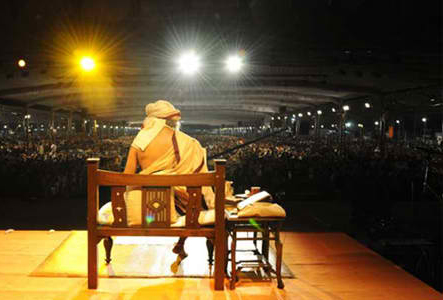Taming The Mind and Ego

“Whatever happiness and peace that one knows in life is generally so fragile that it is always subservient to the external situation.”
—Sadhguru
Sadhguru looks at how Patanjali defines yoga as “chitta vritti nirodha”, or to still the modifications of the mind. He tells us a story to illustrate the point.
Sadhguru: Searching for truth is itself a big illusion because whatever we term “the truth” is always and everywhere. We don’t have to search for it or seek it. It always is. The only problem right now is you are capable of experiencing life only through the limited dimension that we call “mind”.
Patanjali defined yoga as “chitta vritti nirodha”. That is, if you still the modifications or the activity of the mind, you are there: everything has become one in your consciousness. Yoga has innumerable devices, innumerable methods of working towards a still mind. We may be pursuing many things in our lives, we may be going through the processes that we call achievements in our life, but to go beyond the modifications of the mind is the most fundamental, at the same time, the highest achievement because this releases a human being from what he is seeking, from what is within and what is outside – from everything. He becomes an ultimate possibility if he just stills his mind.
What most people are after right now in their lives is fundamentally to achieve happiness and peace. But most spend a whole lifetime and never get to be truly happy or peaceful. Whatever happiness and peace that one knows in life is generally so fragile that it is always subservient to the external situation. So, most people’s lives go in trying to manage a perfect external situation – which is impossible to achieve. Yoga focuses on the inner situation. If you can create a perfect inward situation, no matter what the external situation, you can be in perfect bliss and peace.
The Silent Hero
This reminds me of a certain situation that happened in the South Indian yogic tradition. Once, there was a devotee whose name was Tatvaraya. Tatvaraya encountered a very beautiful master in his life, whose name was Swaroopananda.
This master never spoke. As a human being, he spoke here and there, but as a guru he never spoke. This was a silent master. Tatvaraya found tremendous bliss and joy in being with his guru, and he composed a bharani. A bharani is a certain composition in Tamil, which is generally composed only for great heroes.
Society reacted and protested that a bharani cannot be composed for a man who has never even opened his mouth, who has not done anything except sit quietly. This can be composed only for a great hero – one who has slain a thousand elephants. And this man had never even opened his mouth. Surely he doesn’t deserve a bharani! Tatvaraya said, “No, my master deserves more than this, but this is all I can give.”
There was a big argument and debate in town about this. Then Tatvaraya decided the only way to settle this issue was to take these people to his master. His guru was sitting quietly under a tree. All of them went and sat there, and Tatvaraya explained the problem: “People are protesting because I composed a bharani in your honor. They say it is supposed to be composed only for great heroes.”
The master heard all this and just sat quietly. All of them sat quietly. Hours passed; they sat quietly. A few days passed; they sat quietly. After about eight days of all of them just sitting quietly, Swaroopananda moved his mind. At that point, everyone’s thought process became active. Then they realized a true hero is someone who has tamed these rutting elephants that you call “mind” and “ego”. And both these elephants were still for eight days for everyone just by sitting with the master. So, they said, “Yes, this is the man who truly deserves a bharani.”
Editor’s Note: Excerpted from the ebook “Himalayan Lust”, available at Isha Downloads. Check out the preview for a taste! Amalgamating Sadhguru’s discourses during yatras to the Himalayas, the book is a blend of the specific and the timeless. It is a chance to make a pilgrimage on the page, travelling through the unpredictable but fascinating terrain of the Master’s words.


